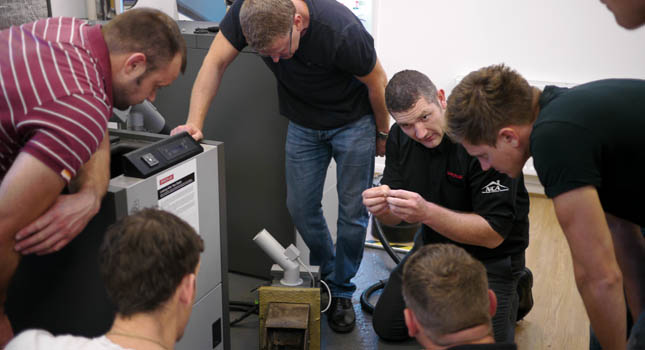

Jed Smith highlights the importance of manufacturer training to get the most out of new products.
Compared to our Eastern European partners, the biomass sector in the UK is embryonic in its development, but there are lessons we can learn from them, especially when it comes to ensuring our biomass market is protected.
Training installers to QCF standards through the various awarding organisations’ training centres is only one step towards ensuring the competence of installers.
Many manufacturers, suppliers and distributors are now looking at protecting both their market and brand by providing additional product specific training, to ensure that installers fully understand the functions and setup of the individual biomass components.
It’s important to pass this product knowledge over to engineers, so they are better equipped to install, commission and maintain a manufacturer’s full range of appliances.
Through dedicated training facilities, manufacturers are able to provide installers with a safe environment to not only put into practise their biomass training, but also align it to the specifics of what they have learnt on product training sessions.
Ultimately, the information received gives engineers a greater understanding of the specific appliances and the installation methods approved by the manufacturer.
By providing specific training, manufacturers can manage the engineer’s expectations in regard to other aspects of the installation, such as after sales support and warranty conditions. It also allows them to stress the importance of maintaining the product in line with the manufacturer’s requirements.
This makes it possible to build a strong network of nationally qualified engineers who have also demonstrated competency on specific product ranges. Manufacturers can then provide that all important reassurance to the market that the product will be designed, installed and maintained effectively, allowing the homeowner peace of mind and security.
Many manufacturers will require that all installers purchasing their products have undertaken specific product training or awareness courses. Held by qualified trainers, these can cover everything from specification to commissioning and the internal workings of the appliance, giving delegates the information they need to understand how the appliance really works.
Training allows engineers to be able to ask questions in a teaching environment, rather than learning on the job and in front of their customer. Another bonus can be that manufacturers are able to use real case studies and provide delegates with an opportunity to network with service and support teams. These practical sessions enable discussions on best practise, giving participants an understanding of what is included in a good commissioning process based on their experiences and case studies from the field.
However, this type of targeted product specific training can only work on the back of the QCF biomass courses, building upon core knowledge to ensure this can be applied on specific product ranges. It is by no means a substitute. Those installers who have attended product courses and are not qualified to QCF standard will not be prepared for what awaits them when designing, installing and commissioning a biomass solution.
What you can expect from attending a manufacturer biomass product course at Specflue is a full day’s intensive training, where a trainer will discuss the best methods for commissioning the various appliances and walk you through the stages one step at a time. The trainer will explain technical specification, share service installer-only knowledge and access to the parameters of each appliance, simulate faults and discuss rectification steps; all of which is preparing you and the product for the challenges of the UK biomass market.
In order to ensure competency across a range of biomass types, it’s important that installers use a variety of boilers and work on different menu systems and hydraulic designs. This is where our renewables and solid fuel training centres provide the opportunity and facilities to ensure the learning objectives are achieved and the delegates have the necessary knowledge when they leave.
So that brings us back to the beginning. The market is new, the products are evolving and so should the installer. It’s vital that anyone working on biomass obtains the necessary QCF level qualifications before attending product specific courses. Product courses are simply no substitute to the full biomass QCF level courses. Both are complementary and both are required if you are to remain competent in this growing sector, providing a quality installation and after sales support process for the consumer.
Jed Smith is head of business support at Specflue
If you'd like to keep up-to-date with the latest developments in the heating and plumbing industry, why not subscribe to our weekly newsletters? Just click the button below and you can ensure all the latest industry news and new product information lands in your inbox every week.